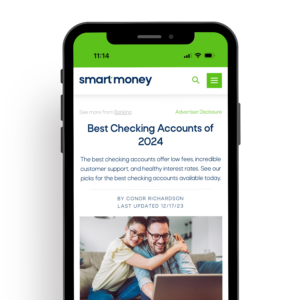Takeaways
- Compounding interest is interest on your initial principal plus accumulated interest.
- Compounding interest grows savings or debt at an exponential growth rate.
- Compounding interest can be compounded daily, monthly, quarterly, or annually.
- The more compounding periods, the faster your funds grow over time.
- Compounding interest grows savings and debt faster for investors and borrowers.
Some of the links in this article are from advertising partners of Smart Money, which does not influence our evaluations or recommendations. We work to provide you with accurate and reliable information. Our opinions are our own.
What is Compounding Interest?
Compounding interest is the interest payment made on the original amount of your savings, called the principal amount plus previously paid interest in the account. It is colloquially known as “interest on interest” because the amount of the interest payment changes from period to period instead of being a fixed amount on the original principal amount.
Simply put, compound interest is the interest income you make as your money grows. What makes compounding interest unique and highly attractive to investors (and borrowers) is that your funds grow exponentially. Exponential growth is the growth rate that becomes more rapid in proportion to the growing total number or size [1]. Therefore, as your principal and accumulated interest grow together, your interest payments balloon as the base of principal and accrued interest build.
Compounding interest is a way to work smarter with your money, not harder. You can earn more income as your savings and investments grow over time. Depending on your annual percentage yield in your checking or savings account, number of periods per year your bank makes interest, and if you leave your funds untouched, you can make some serious interest income.
Get Smart With Your Money
Fresh weekly articles delivered straight to your inbox.
Enter your name and email for free tips and tricks.

How to Calculate Compound Interest
You can use Smart Money’s compounding interest calculator to help calculate how much money you will earn.
However, it is important to understand the underlying mechanics of calculating compounding interest so that you know how the equation variables relate to one another. This will help when researching the best savings account, checking accounts, or other investments.
Here is how the compounding formula works: A = P (1+r/n)^nt
A = Ending Balance
P = Principal Balance (or original balance)
r = Interest rate (Annual percentage rate expressed as a decimal)
n = Number of periods interest compounds in a set time frame
t = Time Frame (daily, monthly, quarterly, annually)
You might be staring blankly at your screen. Don’t worry; this formula will make more sense when we use an example to demonstrate how the compounding formula works. It's easier than it looks. Let’s look at a real-world example:
You have saved a $3,000 emergency fund and are looking for the best high-yield online savings account. You found an account that earns 4% APY and compounds interest monthly. You want to know how much money you will earn if you leave your funds in this account for one year. Here is how your variables would be assigned to the equation:
A = To be Determined
P = $3,000 (original balance)
r = .04 (Annual percentage rate expressed as a decimal)
n = 12 (compounds monthly for one year; the periods are calculated as 12*1=12)
t = 1 (year)
A = $3,000*(1+(((.04)/(12)))^(12*1)
A = $3,122.22
Without having to lift a finger - by choosing to help your funds accumulate interest - you would have turned $3,000 into $3,122.22.
Smart Tip:
Investors flock to high-yield savings accounts because they earn interest income, have low investment risk, and keep their funds liquid. If you invest with a product protected by the Federal Deposit Insurance Corporation (FDIC), your funds are insured even further.
Products That Use Compounding Interest
Compounding interest is used in everyday financial products to facilitate day-to-day transactions or finance large purchases. Importantly, compounding interest is not limited to investment products but also applies to funds that you borrow from a bank, credit union, or other financial institution.

Member FDIC
Axos Bank® Rewards Checking
Smart Money Rating: 5/5
APY: 3.30% with No Minimum Balance
Bonus Offer: Up to $300 Bonus (Terms Apply)
How to Accelerate Compounding Interest
Compounding interest will help you reach your financial goals faster than simple interest. A key variable makes compounding interest all that more impressive: regular contributions.
Revisiting our example above, if you make steady contributions to your emergency fund or slush fund, you will expand and build the base (principal + interest) on which compounding interest is calculated.
You can automate your finances to ensure regular contributions of $100, $200, or $300 to your checking or savings account. These contributions you drip into your account over time will catalyze your compounding interest.
Smart Summary
Compounding interest is evangelized by investors, regular savers, and financial independence retirement enthusiasts for its magic-like ability to accelerate savings over time. When building your investment portfolio, you should consider the annual percentage yield of your investments, compounding interest rate, diversification, and desired risk profile. Taking advantage of compounding interest is a smart money move because it can help you reach your financial goals faster.
(1) Oxford Reference. Exponential Growth. Last Accessed April 9, 2024.











